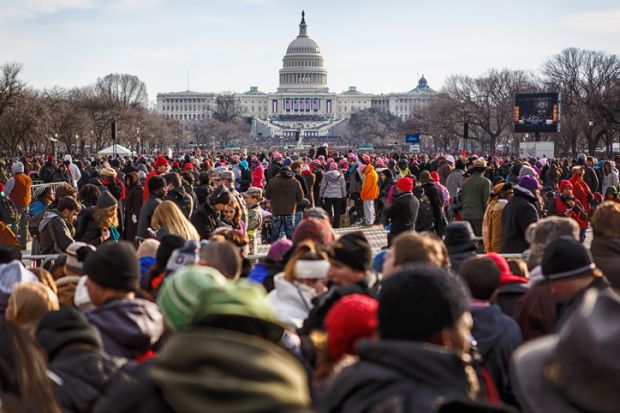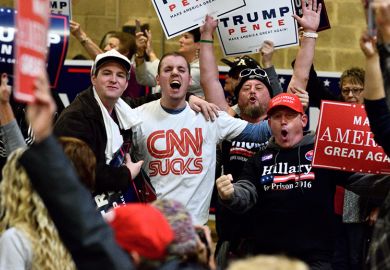In November, we asked a panel of US-based scholars what they had planned for the night of the US presidential election. There was a strong sense that they would be welcoming a victory for Democratic presidential candidate Hillary Clinton.
That, however, is not how things panned out. On Friday 20 January 2017, the Republican Party’s Donald Trump will become the 45th president of the United States.
We asked our panel how they will be spending the day of Mr Trump’s inauguration.
Catherine Clinton, Denman endowed professor in American history, University of Texas at San Antonio
Since I cancelled my plans to visit my two sons (who live in Washington DC), I will take special advantage of my location – spending a year in Louisville on sabbatical during my Guggenheim fellowship – by visiting the birthplace of America’s greatest president, Abraham Lincoln, in nearby Hodgenville, Kentucky.
It will remind me that Lincoln came into office in 1861 derided as being elected by a minority of Americans, declared unfit and subjected to ridicule. He surprised everyone (except his wife Mary) in rising to the occasion: holding the nation together during its darkest hour.
Do I think that the incoming occupant of the White House will in any way approach Lincoln’s greatness? I fear not, as in order to learn from history you have to read it, and to learn from your mistakes you must admit them.
Yet our citizens must not sink under the weight of despair: our country resembles a formidable ship and even if some despise the captain, we must remain afloat. I will face my fears on a Kentucky highway, listening to a book tape of Lincoln’s second inaugural, savouring the memory of a president who fought for liberty and justice for all, who saved the Union and became our first martyr to civil rights.
And on the drive home, I will sing along to Lin-Manuel Miranda’s lyrics for Hamilton: “Raise a glass to freedom/Something they can never take away.” Amen.
Duncan Wu, a British academic who is Raymond Wagner professor of literary studies at Georgetown University, Washington DC
Having attended Barack Obama’s swearing-in ceremony in January 2009 (and writing about it for Times Higher Education), I will certainly be at Mr Trump’s. It will probably be cold and wet – possibly even snowy – so I will dress appropriately, donning the pink pussyhat that my wife has knitted for me.
I'm sure it will be a talking point among the assorted academics, lawyers, lobbyists, bikers and rednecks, who I am bound to encounter. I will take a bottle of whisky, some marmalade sandwiches, a copy of Robespierre’s Oeuvres, the US Constitution, and the European Union flag, which I will unfurl as Mr Trump is sworn in.
After, I will adjourn to the Trump International Hotel (so-called), or the building that I call the Post Office, on Pennsylvania Avenue, where I will toast European unity with a Dirty Martini.
Kori Schake, research fellow at the Hoover Institution, Stanford University
Like many Americans, I thrill at the majesty of our nation’s capital – the symbolism of legislative supremacy in the Capitol dome and essentiality of knowledge for good governance alluded to by the elegance of the Library of Congress, the modesty of the White House, the nobility of the Supreme Court’s inscription of equal justice under law, the treasure trove of the Smithsonian’s free museums, that the most beautiful building in the city enshrines cooperation with our neighbouring states in the Americas.
But in recent years I also recoil from the extravagance of money on display. While I have no objection to opulence in my country’s financial (New York), innovation (District of Columbia), or image (Los Angeles) capitals, it feels un-Republican in the capital of our governance, where the money comes from taxpayers. And Washington DC, is at its most garish during the inauguration of a new president.
So I’ll be in Norway on inauguration day, surveying that good American ally’s border with Russia and learning about emergent security challenges in the Arctic.
Alan Ruby, senior fellow, University of Pennsylvania’s Graduate School of Education
Friday 20 January will be largely business as usual. At 10am, as the crowds assemble in Washington DC to witness, celebrate and oppose the transfer of power, I will begin teaching at the University of Pennsylvania in Philadelphia where the “Founding Fathers” agreed on the principles of American democracy.
As the new president takes the oath of office, I will lead the students in a discussion of independent thinking and how to assess the veracity of public statements. We will examine how different nations invest in higher education and try to make it more accessible. And we will look ahead.
Notwithstanding the calls for change in every arena during the election campaign, to me it seems that little will change in how the US federal agencies relate to public universities. It is possible that private and for-profit universities and colleges may be subject to less regulation and reduced institutional oversight.
In the end, caveat emptor is as important in education as in politics because an educated citizenry is a cornerstone of democracy.
Howard Segal, professor of history, University of Maine
I will be spending most of Inauguration Day re-reading parts of Edward Gibbon’s seven-volume The History of the Decline and Fall of the Roman Empire (1776-1789). I’ve not read any of it for years, but the timing seems right for a second look.
Gibbon attributed the empire’s defeat at the hands of the barbarians to a steady loss of civic virtue among ordinary citizens. Does history ever repeat itself? I will also try to track down a reported 2017 abridged edition with a new introduction by unspecified members of the Clinton Foundation. If true, what a timely publication!
Register to continue
Why register?
- Registration is free and only takes a moment
- Once registered, you can read 3 articles a month
- Sign up for our newsletter
Subscribe
Or subscribe for unlimited access to:
- Unlimited access to news, views, insights & reviews
- Digital editions
- Digital access to THE’s university and college rankings analysis
Already registered or a current subscriber? Login








